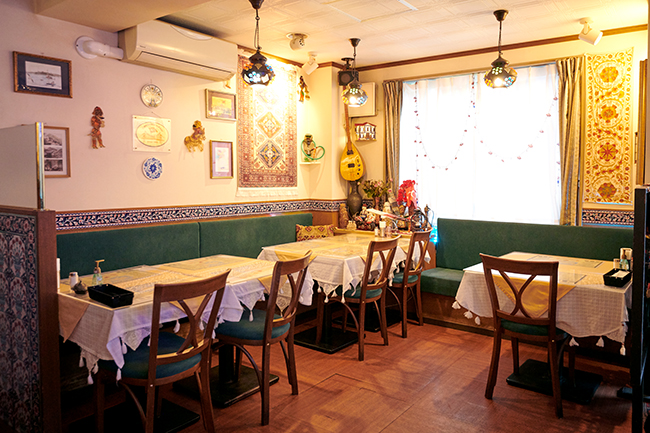Salça: Fermented Tomato Paste Central to Turkish Food
Feb 25,2021
Salça: Fermented Tomato Paste Central to Turkish Food
Feb 25,2021
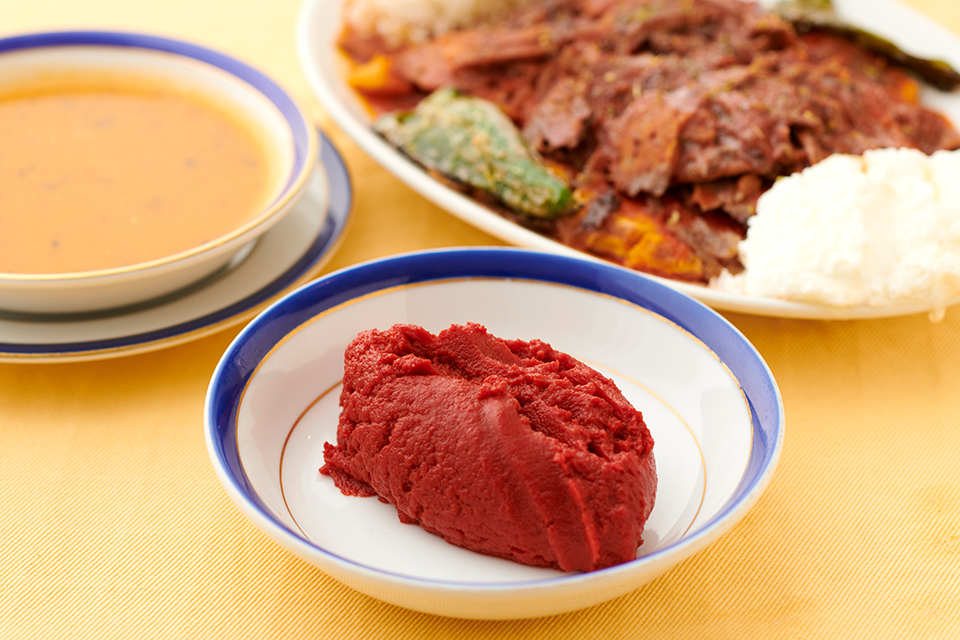

Located at the crossroads between Europe and Asia, Turkey boasts a vibrant culinary culture influenced by the countries of both continents. Turkish cuisine is considered one of the world’s three great culinary traditions because of its excellent taste and great variety. One fermented condiment indispensable to Turkish cuisine is salça, which is found in the kitchen of every Turkish home. So what kind of flavoring is it? To find out, we turned to a couple from Turkey: Sibel and Riza Akyildiz, who run the Turkish restaurant Bosphorus Hasan in Ichigaya, Tokyo.
Having learned that Turkey had a fermented condiment that performed a similar function to Japanese miso, I recently visited the Turkish restaurant Bosphorus Hasan in the Ichigaya district of Tokyo. Bosphorus Hasan was founded by Riza’s father Hasan Unal in 1993. Currently run by Sibel and her husband Riza, it now has two locations, in Ichigaya and Shinjuku 2-Chome. It’s hugely popular with the Turkish expatriate community in Japan, because the food tastes exactly as it does back home. First, I asked Sibel and Riza about salça.
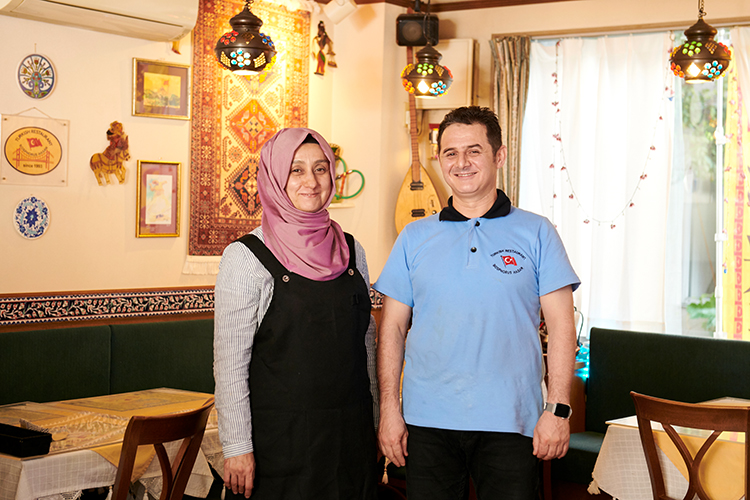
Sibel and Riza Akyildiz. Riza’s father Hasan Unal had his own restaurant in Turkey. He came to Japan in 1987 and cheffed for five years at Japan’s first Turkish restaurant before opening Bosphorus Hasan.
“Salça is a condiment made mainly with tomatoes,” Riza explains. “In the old days, every family would stock up on tomatoes when they were in season during the summer and make a year’s worth of salça at home. I guess it was a cheap way to preserve tomatoes. My grandmother would buy lots of tomatoes, dry, ferment, and stew them, and then bottle them. I remember it well.”
“Why don’t you try it?” says Sibel, giving me some salça. It was very rich and packed with tomato flavor. This is the taste that Turkish cuisine is built on. People wanted to enjoy the delicious flavor of tomatoes year-round, so they fermented them to make them last longer. As long as you have salça, you can create all kinds of dishes while varying the flavoring of each by using salt or olive oil or garlic.
“Why don’t you try it?” says Sibel, giving me some salça. It was very rich and packed with tomato flavor. This is the taste that Turkish cuisine is built on. People wanted to enjoy the delicious flavor of tomatoes year-round, so they fermented them to make them last longer. As long as you have salça, you can create all kinds of dishes while varying the flavoring of each by using salt or olive oil or garlic.
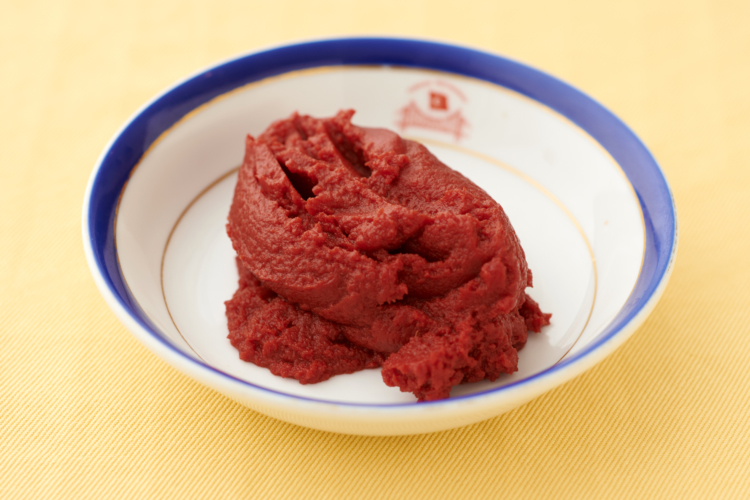
Salça, the fermented condiment indispensable to Turkish cuisine. It’s known as the Turkish miso.
But making salça, once a rite of the season, steadily became less common. Eventually, almost all families ended up buying the bottled variety, especially in the city.
“Now there’s been another change, though. My mother used to use store-bought salça, but lately younger people have started making their own salça again, because they’re concerned about their health and there’s a growing fad for homemade foods. My friends living in Turkey make it every year.”
Salça can be made using either tomatoes or red peppers.
“Whether people prefer tomato or pepper salça depends on the region. Here at Bosphorus Hasan, we use salça made with tomatoes.”
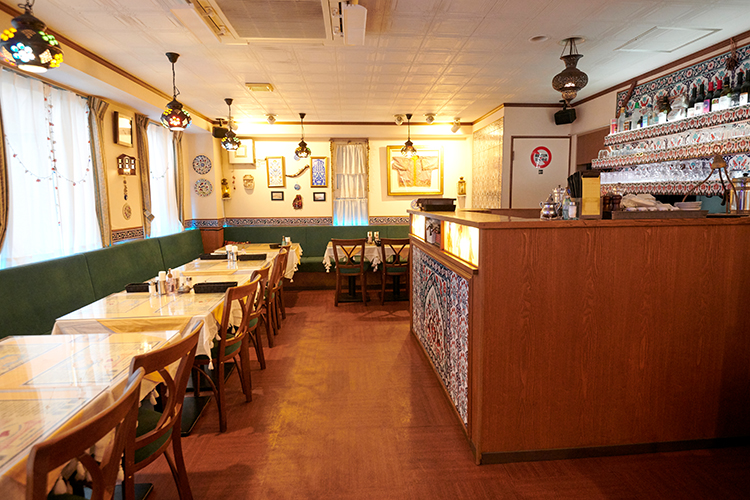
Bosphorus Hasan is frequented by long-time patrons and Turkish expatriates seeking authentic Turkish cuisine.
Tomato salça is featured in many different dishes, including soups, kebabs, and stews.
“Salça is used in most of the dishes on the menu. Our customers are surprised when we tell them that. ‘Everything’s tomato-flavored?’ they ask. But salça yields a completely different flavor depending on how you season and use it.
“Take, for example, Iskender Kebab or doner kebab beef with tomato sauce, a traditional dish of the Turkish city of Bursa. It consists of sliced pita bread topped with beef slathered in a salça-based sauce with spices, plus melted butter. It tastes deliciously refreshing eaten with yogurt.”
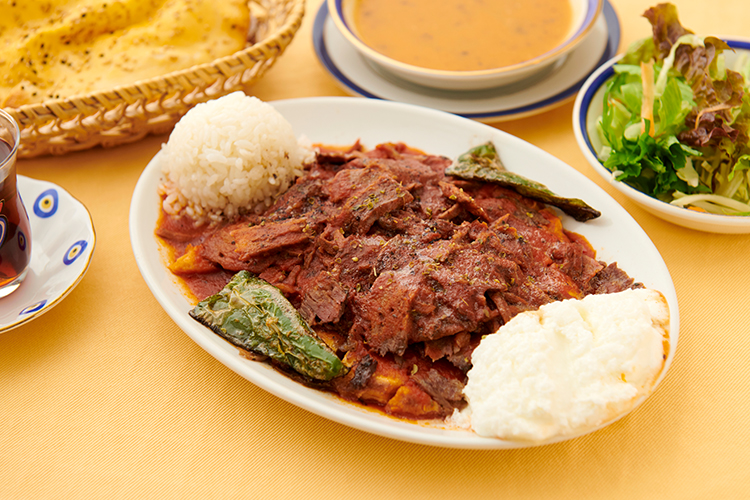
Iskender Kebab, a specialty of Bursa. This popular dish lets you experience the great taste of salça.
Stewed foods are another staple of Turkish cooking.
“Karnabahar , for example, is also a popular menu item. ‘Karnabahar’ is the Turkish word for cauliflower. This dish consists of cauliflower, chicken, and vegetables cut into large pieces and stewed in a sauce made with salça. Salça is also used for making Turkish-style boiled dumplings, called manti. It would be hard to make anything Turkish without salça.”
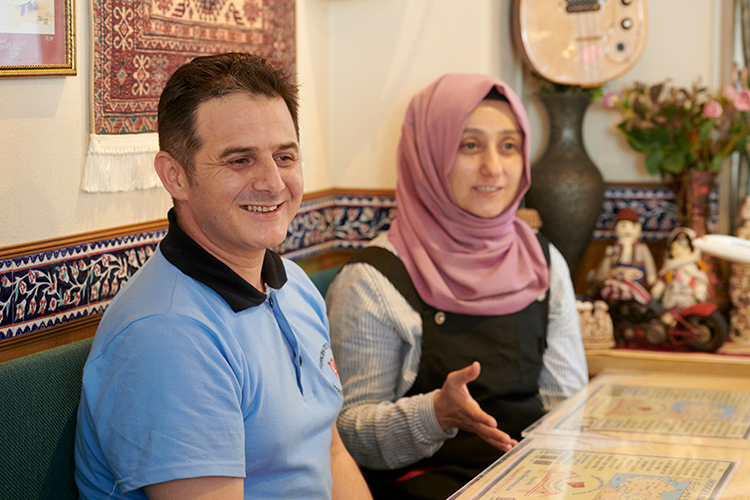
Riza is from Istanbul and Sibel is from a city called Çorum. They have similar tastes in food, though each region of Turkey has its own distinctive local cuisine. Ingredients and how they’re seasoned vary from place to place.
“For instance, Urfa (Sanliurfa) is famed for red chili peppers. Natives of Urfa are therefore known for liking spicy foods. Salça from Urfa is hot and spicy too.”
One dish for which Urfa is renowned is cig kofte, or raw meatballs. This is a spicy dish made with biber salça — red pepper salça — and eaten with pomegranate extract. It’s uncommon even in Turkey, being confined to Urfa.
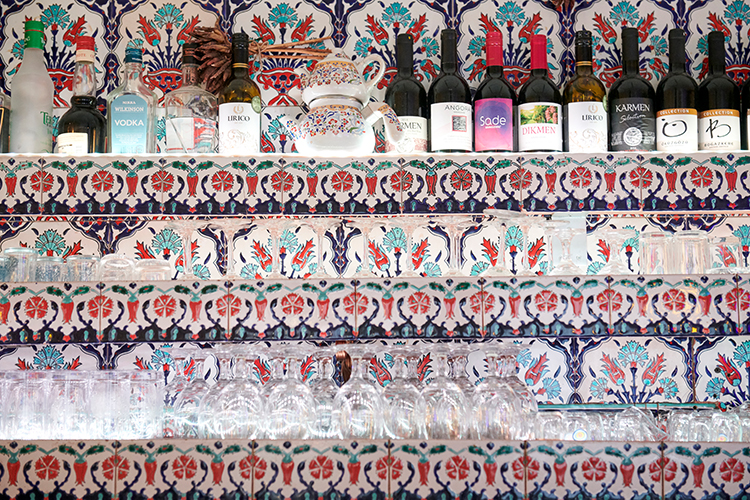

The restaurant interior with its stunning Turkish tiles. Here you can experience a slice of Turkey.
“Anchovy dishes are common in cities on the Black Sea. The anchovies caught in the Black Sea are called hamsili, and the Black Sea region is famed for Hamsili Pilaf. It’s a popular item on our menu. Anchovies and salça go wonderfully together. They’re just delicious.”
It will likely be a little longer before we’re all free to travel overseas again. But you can always take a tour of Turkish cuisine and experience the kaleidoscope of flavors that salça makes possible.
